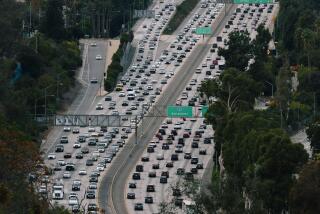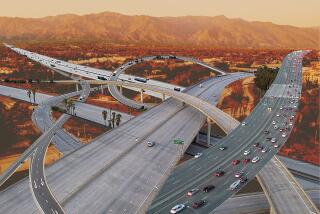Golden Pylon Awards put a positive spin on traffic
- Share via
They’re not the Emmys or the Oscars, and the gift baskets aren’t full of expensive goodies.
But for the people who break into television and radio programming every so often to tell you how traffic is on the 405 and 110 freeways, this was their day in the driver’s seat.
It was the annual Golden Pylon Awards, which were dished out Wednesday at Maggiano’s Little Italy restaurant at the Grove. Pylon is the fancy word for traffic cone, which for drivers always signals trouble ahead.
“Even though it’s looked at as filler, most of the time [the information] really can help,” said one winner, Vera Jimenez of KCBS-TV Channel 2. “It’s the most immediate information you can give to people. It’s the difference between getting to work on time or being late.”
The reporters at the luncheon joked about traffic -- commuters sneaking into the carpool lane with a mannequin that they may, or may not, have been dating -- and ate strawberry cheesecake while quirky messages on a slide show promoted Rideshare Week, which begins Monday.
“Bring us your tired, your poor, your commuters yearning to avoid traffic,” one of the messages read.
The awards, in their 13th year, are sponsored by regional transit agencies and are given to reporters who help promote ways to relieve congestion by reminding commuters to share a lift or hop on the bus or train.
For Mark Wheeler, a Pylon winner who reports morning traffic on KLOS-FM (95.5), there have been humorous moments throughout the years of warning commuters about pile-ups and police pursuits, such as the time a beer truck spilled over on the 405 Freeway.
“It was funny because it was cleaned up so fast,” he joked.
But it’s the sobering times that Wheeler remembers more vividly, such as the fatal big rig crash that closed Interstate 5 in 2007.
He said that after being a traffic reporter, he now drives around the region with a different eye. He can visualize where accidents have happened and always remembers that anything can go wrong at any time.
He remembered that when he started reporting traffic, “it was the CHP and people calling us up.” But now the job has changed, he said, because there are so many more electronic tools, including video cameras and maps, that help monitor speeds.
He and other reporters, such as Pylon winner Arianna Ortiz, who reports on KFWB-AM (980) and other stations, said their greatest satisfaction comes from their daily work -- recognizing breaks in the normal patterns of daily traffic and helping ease commuters’ delays if they can offer sound advice.
“There are people that really depend on traffic reports,” Ortiz said. “It still feels like a really important service.”
She said live traffic reporters can provide drivers a calm voice offering alternate solutions. A few weeks ago, when an irate driver on the 405 Freeway called her to complain, she merely engaged him in a discussion.
The goal is to “be in the car with them and let them know everything’s going to be OK,” she said. Then she joked: “Maybe traffic reporters can be the cure for road rage.”
--
More to Read
The complete guide to home viewing
Get Screen Gab for everything about the TV shows and streaming movies everyone’s talking about.
You may occasionally receive promotional content from the Los Angeles Times.





